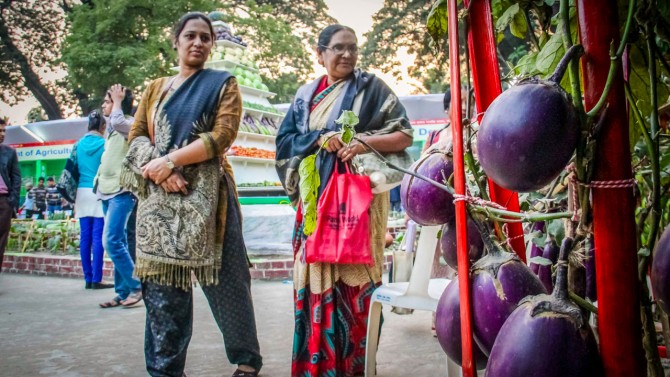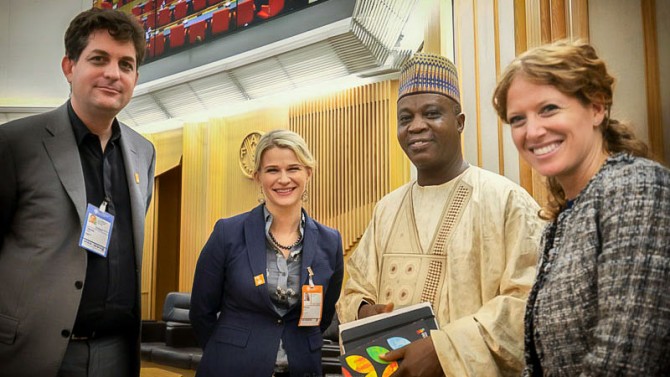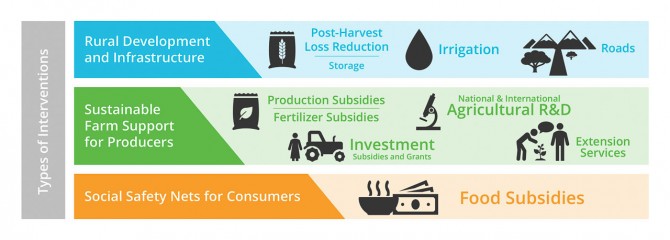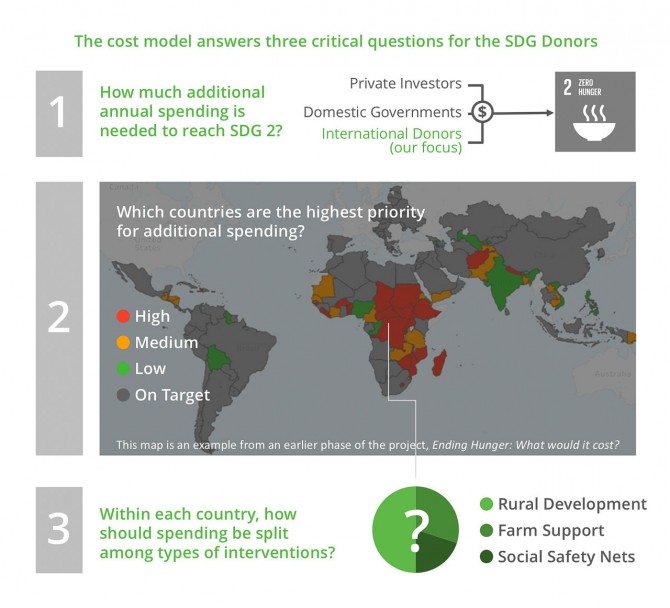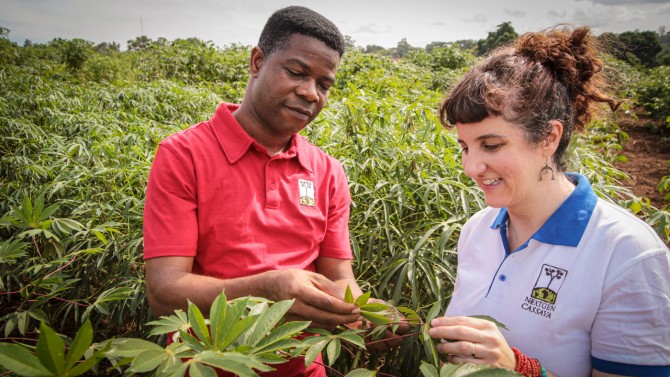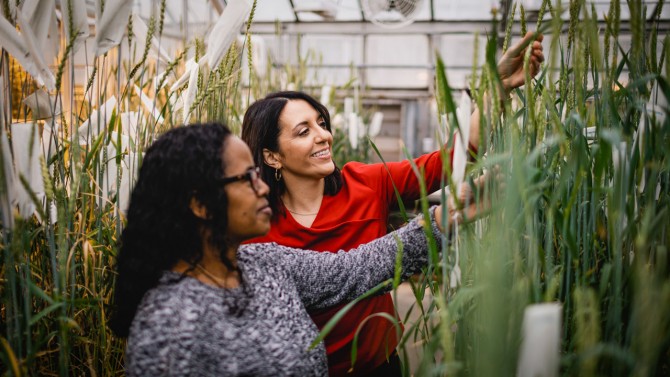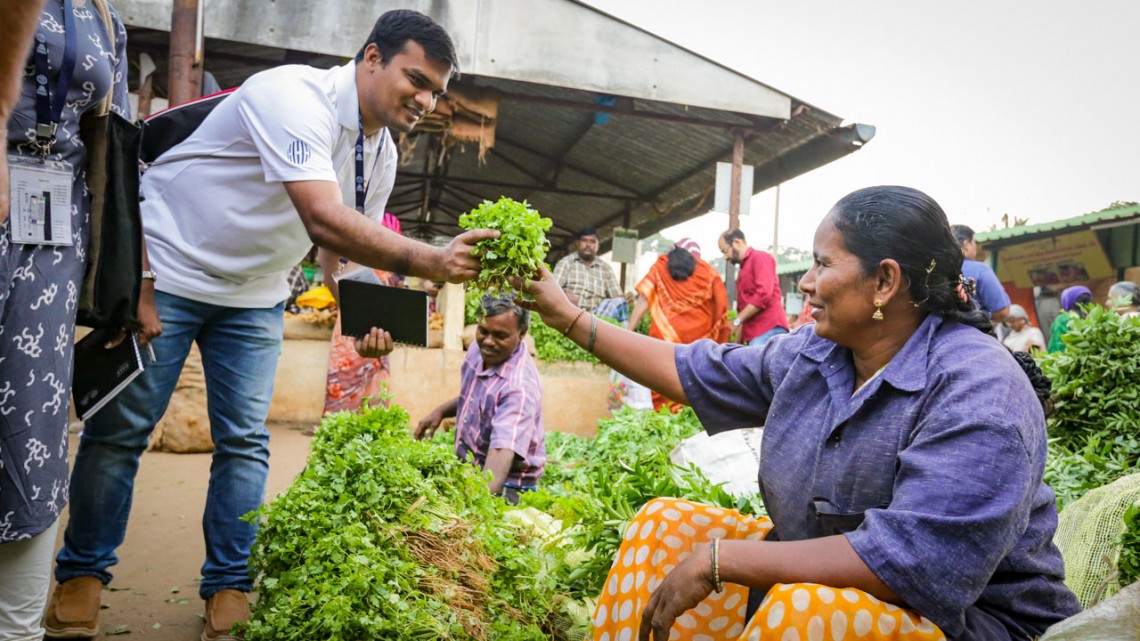
Tanvir Ahmed, left, a Cornell Hubert H. Humphrey Fellow, buys produce at a market in India in January. The Ceres2030 project found education helped small-scale farmers, like those at this market, adopt climate resilient crops to achieve steady production.
Cornell unites science and policy to end hunger
By Jose Beduya
Like all the farmers in her village in central Ethiopia, Hadjo Mergo works the land to feed and sustain her family. Confronted with scant income from low-yielding wheat and beans, she knew her land could support more food if only she could acquire seeds of improved crop varieties and access the most current agricultural knowledge.
New farming methods and crops that perform better in a changing environment are essential to higher living standards, but obtaining these innovations are too often impossible for small-scale farmers. “Our interest is to have improved seed varieties like beans,” she says. “We want them so our community and our people can succeed.”
For years, policymakers in her country had promised that better days were ahead for farmers like her. But those assurances rarely translated into more bountiful harvests or meaningful economic opportunities.
The agricultural policymakers themselves faced their own challenges: how to identify the latest research that could translate into gains for the farmers in their districts, countries and regions. With limited agricultural data at their disposal, they wrangle estimates from inaccurate or out-of-date information as they try to make life better for the people in their districts.
Those policymakers often rely on donor-supported programs to accelerate agricultural programs. And just like the farmers and policymakers, the donor agencies themselves are often in the dark about what actions can bring tangible results to smallholder farmers and the world’s hungry.
“Ending hunger is an amazing, achievable goal that everyone can get behind, but in reality it’s extremely complex and frankly unsolvable if we don’t commit to thinking differently about how we solve it,” says Jaron Porciello, who leads Ceres2030 in the Department of Global Development. “This undertaking requires all hands on deck – not just farmers, but scientists, politicians, governments and policymakers, working together. It needs a holistic approach.”
In September 2015, the United Nations set an ambitious timetable to solve a series of sustainable development goals. No. 2 on its list was an initiative to achieve zero hunger by 2030.
The global hunger eradication effort has brought thousands of researchers backed by billions in agricultural and development projects. For private and government donors that are committed to participating in these goals, such as the Bill & Melinda Gates Foundation, the United States’ Agency for International Development and Germany’s Federal Ministry of Economic Development and Cooperation, the clock is ticking to find solutions that can be used to eradicate hunger for poor, rural communities all over the world. With less than ten years and more than 550 million people affected by hunger, donors need a mix of proven solutions to help them prioritize where they will spend their limited resources.
Policy meets evidence
Ceres2030 is a hunger initiative, but one that tackles the issues in a whole new way. It brings together a network of global scientists – mostly early to midcareer researchers, many from developing countries – to provide policymakers and funding agencies with a road map for investing in evidence-based practices and technologies for boosting crops, empowering farmers and protecting the environment. It’s the kind of big thinking approach to agriculture that brings together global scientists across multiple disciplines, which Cornell is known for.
“Nothing on this scale has ever been done because we lacked the tools to analyze this complex information,” Bill Gates says, speaking Oct. 13 at an online event hosted by the German Federal Ministry for Economic Cooperation and Development. “But with the new research, solid evidence will drive better policymaking.”
Millions of research articles about agriculture are published around the world each year. The problem isn’t one of quantity: it’s how to navigate the huge amount of data to extract meaningful information that can translate scientific understanding into actionable results.
“The agricultural research landscape is a patchwork,” Porciello says. “In order for us to do our work properly, we needed to bring together science literature and ‘grey literature’ – like reports from the World Bank, which is what policymakers often read – into one environment for analysis.”
The project harnesses machine-learning and data-mining tools to gather published research from disparate platforms and scattered sources. Cornell experts like Haym Hirsh, professor of computer science in the College of Engineering, and Stefan Einarson, director of information technology in the College of Agriculture and Life Sciences’ Department of Global Development, were brought together with private-sector scientists to work with Porciello to create a machine-learning model that can rapidly analyze summaries of articles and reports with a focus on policy interventions.
Assembling a global team
In the next phase of the project, eight research teams were assembled to focus on critical areas: employment for the future, reducing food loss, vibrant food systems, climate-resilient plants, livestock feed solutions, water-scarce solutions, policies for sustainable practices, and farmers’ organizations.
Each research team aimed to distill the thousands of articles into an evidence synthesis – a compilation of the most current and relevant research that will help governments and philanthropic institutions identify and fund proven agricultural interventions.
By spring 2019, Porciello used the machine-learning model to help her identify a group of 77 scientists, economists and researchers from 23 countries.
Each team was assigned a lead author, as well as a librarian (from Cornell and other institutions) who served as a co-author and the expert in developing search strategies, designing protocols and applying methodologies.
The librarians performed complex searches across multiple resources, and then shared the search results with the researchers, who then screened those results for inclusion, says Kate Ghezzi-Kopel, a librarian at Mann Library and lead for the Ceres2030 librarians.
“Librarians are trained as information managers, teachers and leaders, and their involvement was integral to the success of Ceres2030,” says Ghezzi-Kopel. “We hope this project will encourage researchers performing evidence syntheses to engage with librarians on a wide scale.”
Breaking new ground, finding gaps
Performing systematic reviews and evidence syntheses is standard practice in the medical field and the health sciences, but it had rarely been applied to agricultural research before Ceres2030.
“Doing evidence synthesis in agriculture is kind of like the Wild West in that there are really no rules already established,” says Erin Eldermire, a librarian in the Flower-Sprecher Veterinary Medicine Library and a member of the Ceres2030 team focused on livestock feed solutions. “We’re all kind of figuring it out as we go along, how to apply this methodology to this discipline.”
The Ceres2030 research teams have created search strategies and protocols – methodological documents detailing how the research will be analyzed, which are common in medical disciplines to help protect the integrity of the research. The teams have shared their strategies and protocols in Open Science Framework so that future researchers can not only reproduce but also continue to expand the research, Eldermire says.
Ceres2030 also helps scientists and policymakers recognize gaps in research, especially regarding gender issues as well as socioeconomic factors that have an impact on agricultural interventions, says Hale Ann Tufan, senior research associate in the Department of Global Development and co-director of Cornell’s Gender-responsive Researchers Equipped for Agricultural Transformation.
“Do researchers sex-disaggregate their data and analyze results to compare experiences, limitations and differential impacts on men and women? Do they look at other intersectional factors like education status, age or family size?” Tufan says. “We asked these and other questions, and noted the absence of informative data for gender issues in how farmers adopt climate-resilient varieties.”
These pieces of information are vital to better understanding and addressing gender and socioeconomic disparities in the distribution of agricultural resources and opportunities, she says.
“Being able to convey some of the challenges that we have in research is important for policymaking, and policymakers commissioning more gender-responsive research is equally important,” Tufan says.
Sharing through open-access
On Oct. 12, the eight research teams published their evidence syntheses in a collection of open-access articles in Nature Research Journal publications, and Ceres2030 delivered its findings to the German Federal Ministry of Economic Cooperation and Development in a virtual ceremony with German Minister of Economic Cooperation and Development Gerd Muller.
“The Nature collection all have a huge community of influencers who can make sure that our evidence and our results reach the right people,” says Maricelis Acevedo, senior research associate in the Department of Global Development and lead author on a paper in the Ceres2030 collection.
Acevedo is confident policymakers and philanthropists will be guided by Ceres2030’s scientific evidence. But, most of all, she thinks of farmers like Mergo, who – given the knowledge and support – will make better lives for themselves and their communities, with abundant food and hunger all but eradicated.
“There’s nothing more rewarding,” Acevedo says, “than seeing science in action out on the fields, having an impact in people’s lives.”
Media Contact
Get Cornell news delivered right to your inbox.
Subscribe